Winter often blankets the world in a serene, frosty embrace. As the landscape transforms into a snow-covered wonderland, it’s natural to wonder how our furry friends, particularly cats, cope with the cold season. Do cats, like some other animals, hibernate during the winter months? The idea of cat hibernation in winter sparks curiosity and concern among pet owners.
This article will unravel the mystery of cat hibernation during winter. We’ll explore the nature of hibernation, understand how winter affects cats, and delve into the intriguing behaviors of our feline companions when the temperature drops.
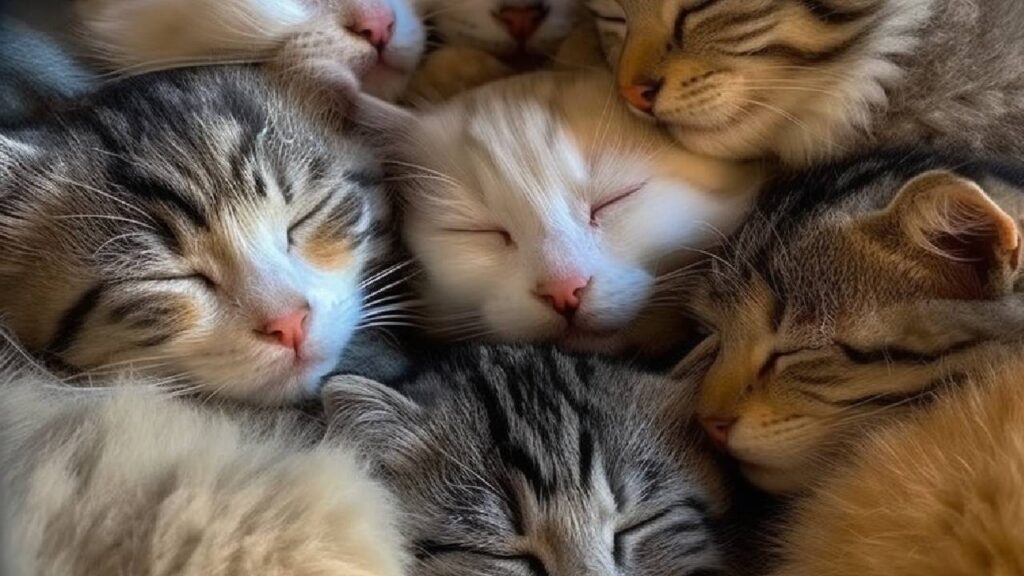
What Exactly Is Hibernation?
Hibernation is a fascinating survival strategy that various animals employ to endure harsh environmental conditions, particularly during the winter. It’s a state of dormancy that helps these creatures conserve energy as food becomes scarce and temperatures plummet.
During hibernation, an animal’s metabolic rate drops significantly. Their body temperature, heart rate, and breathing slow down to conserve precious energy reserves.
This allows them to survive for extended periods without frequent meals. Instead, they rely on stored fat reserves to sustain them throughout the winter. Hibernation isn’t just a deep sleep; it’s a state of torpor where animals can be awakened, albeit with difficulty, if disturbed.
Many small mammals like bears, groundhogs, and some species of squirrels are well-known hibernators. They retreat to cozy burrows, nests, or dens to weather the cold months until spring returns.
Do Cats Hibernate if They Need to?
Unlike some animals known for hibernation, cats do not truly hibernate during the winter. Instead, they exhibit behaviors and physiological changes distinct from hibernation but serve as adaptations to cope with colder weather and scarcer food sources.
While cats experience some changes in response to winter conditions, these changes are not as dramatic or prolonged as true hibernation. Cats are obligate carnivores, and their metabolism is finely tuned to a meat-based diet.
Unlike herbivorous hibernators that rely on stored fat, cats need a more continuous intake of calories to meet their nutritional requirements.
Therefore, a prolonged period of inactivity and reduced metabolic rate, as seen in hibernation, would not be suitable for their survival. However, cats do adapt to winter in their own ways. They tend to sleep more during colder months, seeking warmth and conserving energy.
You might notice your cat spending longer hours nestled in a cozy spot indoors during winter. This behavior helps them minimize exposure to the cold and reduce their calorie expenditure.
Torpor or Comfort?: Understanding Cats’ Winter Behavior
Cats are crepuscular animals which are most active during dawn and dusk. During the winter months, they may extend their sleeping hours. One reason for this behavior change is the pursuit of warmth. Cats are experts at finding cozy spots, such as a sunny windowsill, a soft blanket, or the proximity of a heating source. By conserving energy through longer sleep, they can stay warmer and more comfortable in their chosen spots.
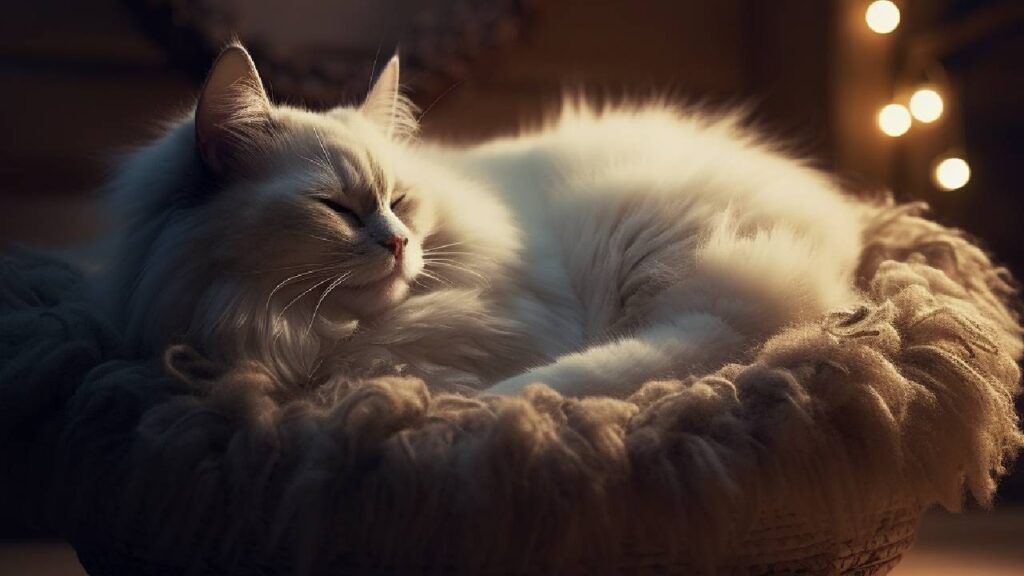
The Signs of Seasonal Changes & How Winter Affects Cats
Winter brings about noticeable changes in outdoor and indoor cats’ behavior and habits. These changes are adaptations to cope with colder weather conditions and limited food availability.
- Thicker Fur
Cats often grow a thicker coat in preparation for winter. This provides better insulation against the cold and helps them retain body heat. - Reduced Activity
Cats would conserve energy in the wild by reducing their hunting and exploration activities. Domestic cats also tend to be less active during the winter months. You may notice your cat lounging more and less time playing outdoors. - Seeking Warmth
Cats are drawn to warm spots. They may seek out sunny windowsills, cozy blankets, or your lap for warmth. Providing heated beds or cozy hideaways can make your indoor cat more comfortable during winter. - Increased Sleep
Cats are known for their love of sleep, and this tendency may intensify during the winter. Longer nights and colder temperatures encourage cats to snooze more. It’s common for cats to sleep anywhere from 12 to 16 hours a day during this period. - Decreased Appetite
Cats may eat less during winter. This is partly due to reduced activity but also because they need fewer calories to maintain their body temperature when it’s cold. - Hunting Behavior
Even indoor cats may exhibit more hunting behavior during winter. They might “hunt” toys or play more energetically indoors to expend pent-up energy.
Helping Your Cat Through the Winter Months
As a responsible cat owner, there are several steps you can take to ensure your feline friend stays healthy and comfortable during the winter months:
Warmth
Ensure your cat has access to warm and cozy spots in your home. You can provide heated beds or pads, place blankets in their favorite resting places, and ensure they have a comfortable, draft-free sleeping area.
Company
If you work long hours or are away frequently, consider getting another cat as a companion. Cats often keep each other company and provide warmth and comfort.
Play and Stimulation
Keep your cat mentally and physically engaged with interactive toys and play sessions. This helps prevent boredom and maintains their activity level, even when they spend more time indoors.
Proper Nutrition
Monitor your cat’s food intake. While they may eat less during winter, ensuring they’re getting the proper nutrition is essential. Consult with your veterinarian if you need clarification on their dietary needs.
Grooming
Brush your cat regularly to help with shedding and matting. Cats may develop thicker fur during winter, and grooming can prevent hairballs and keep their coat in good condition.
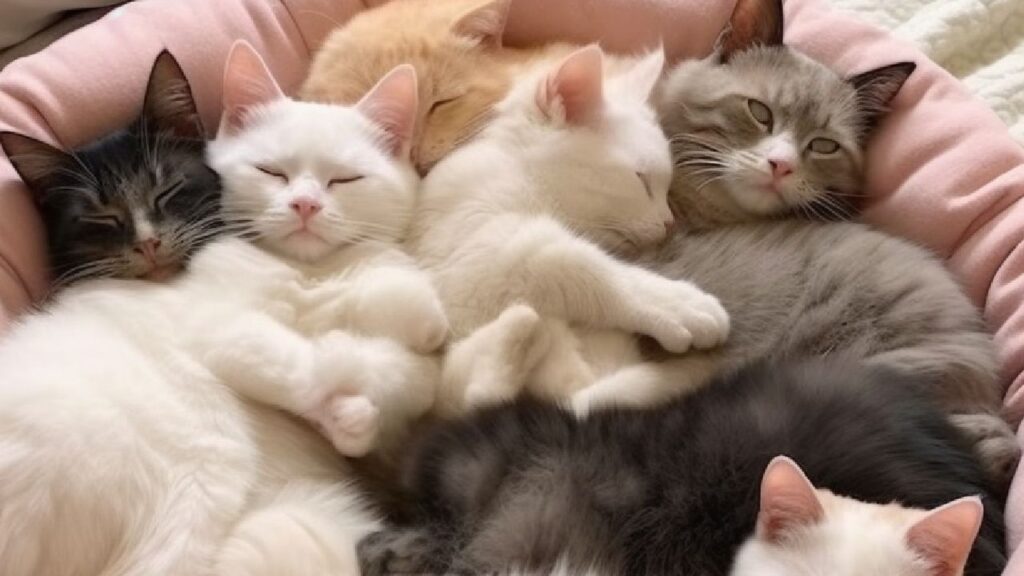
Hydration
Ensure your cat has access to fresh water at all times. Sometimes, cats may drink less in colder weather, so it’s crucial to encourage hydration.
Safety
If your cat does go outside, ensure they are well-protected. Provide a warm shelter, limit their time outdoors during extreme weather, and make sure they are visible to avoid accidents.
Vet Check
Schedule a vet checkup before winter to address any health concerns. Older cats, in particular, may have special needs during colder months.
Indoor Enrichment
Create an enriching indoor environment with scratching posts, climbing structures, and toys. Cats love to explore, and this can help alleviate any restlessness.
Conclusion
Winter can be challenging for cats, but your feline friend can thrive with your care and attention. Remember that every cat is unique, and it’s essential to tailor your approach to their needs and preferences. By providing warmth, stimulation, and love, you can ensure your cat enjoys a cozy and content winter, making the season joyful for both of you.

FAQs
Do indoor cats experience changes in behavior during the winter season?
Indoor cats might show variations in activity levels and seek warmth during colder months. They may sleep more and be less active, a natural response to the weather.
How can I keep my outdoor cat safe and warm during winter?
Provide a well-insulated outdoor shelter with warm bedding to protect it from wind and moisture. Ensure your outdoor cat has access to fresh water and food, and monitor their well-being during winter.
Are there specific winter care tips for senior cats?
Older cats are more sensitive to temperature changes. Ensure they have cozy resting spots, and consult your vet for any specific concerns about their health during winter.
Which cat breeds sleep more during winter?
Certain cat breeds may appear to sleep more during winter due to their natural tendencies and physical characteristics. Breeds like the Ragdoll and British Shorthair are known for their calm and laid-back nature, which can lead to more extended sleep patterns regardless of the season.
Are cats lazier in winter?
Many cats may be less active during the colder months, but this doesn’t necessarily make them “lazy.” It’s a natural response to conserve energy and stay warm. Cats are adaptable animals, and their activity levels vary based on environmental factors.


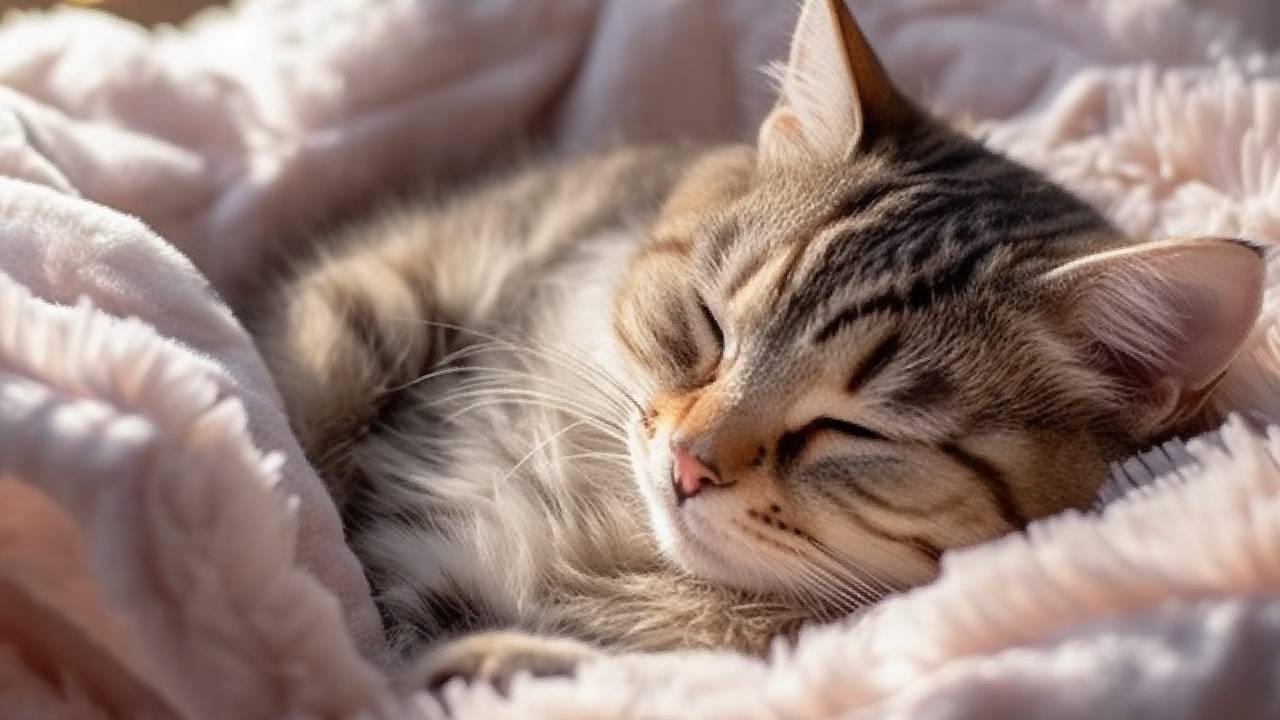
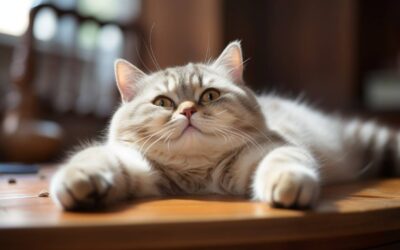
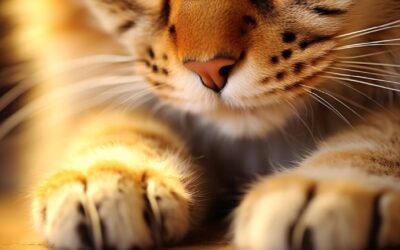

I had no idea that some cats go into a semi-hibernation mode during the winter. Nature is truly fascinating.
Cats hibernate? That’s news to me! I always thought they were just sleeping more in winter. Thanks for the interesting info; I’ll be more considerate about disturbing my kitty’s winter slumber now. 😴❄️